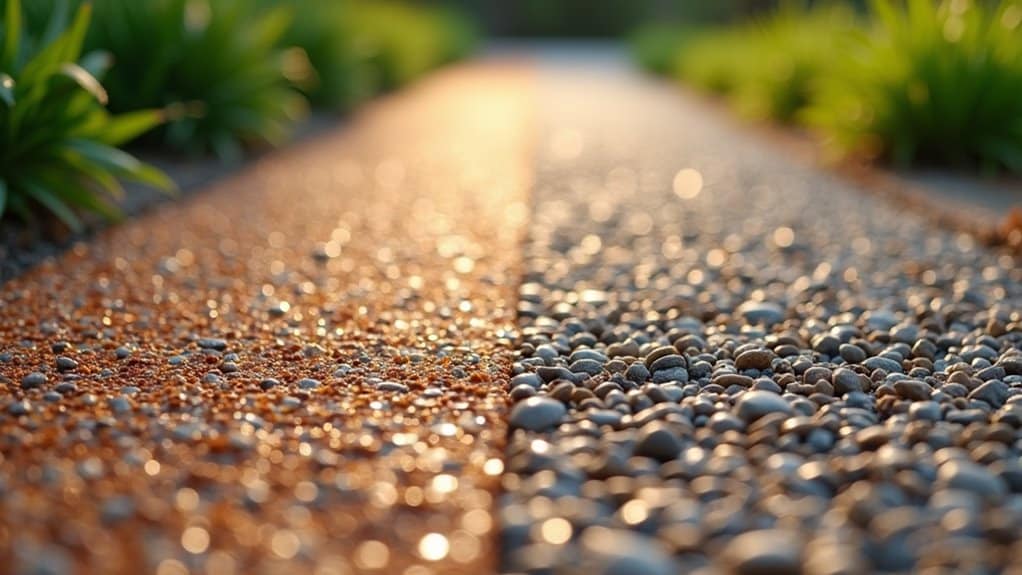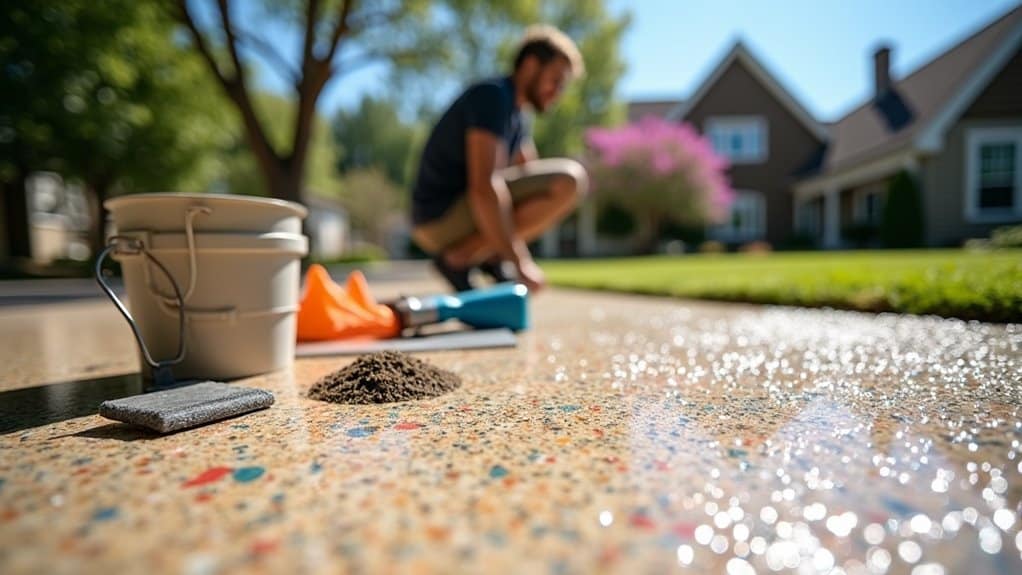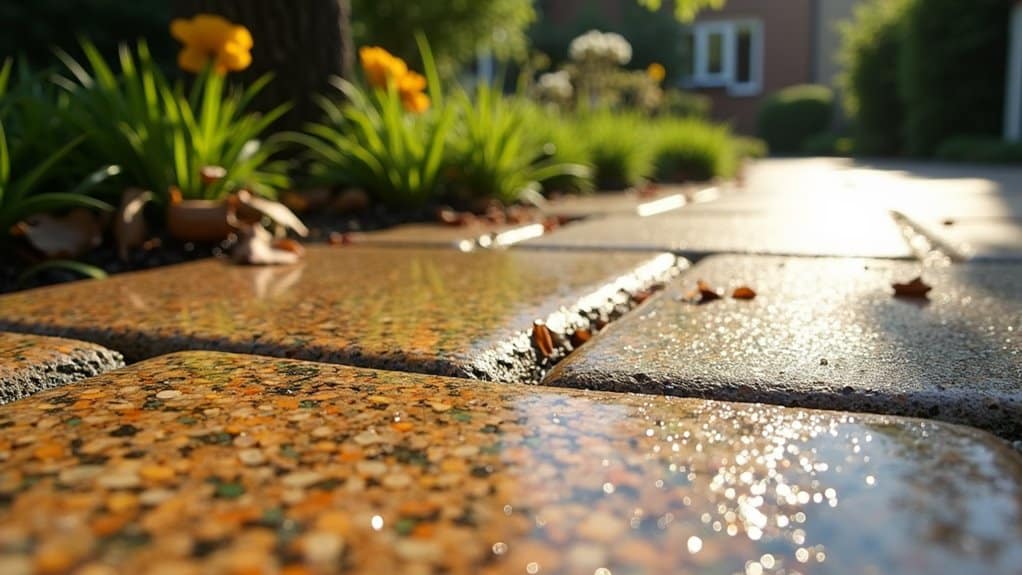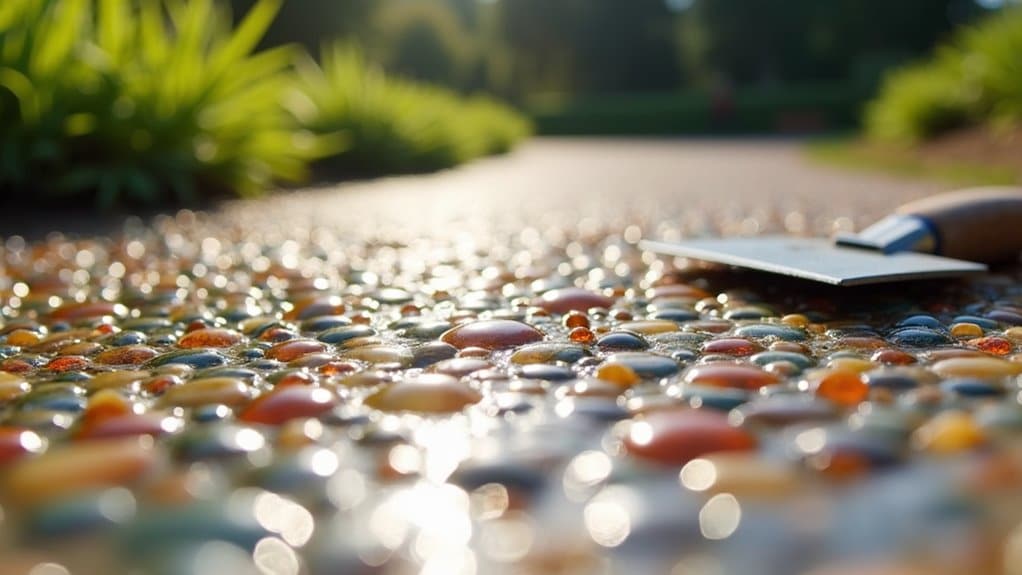Resin bound surfacing offers a practical solution for UK driveways, paths and patios. The process mixes natural stone with clear resin to create a smooth, porous surface that typically lasts 40 years when properly maintained. Much like tarmac, it's hardwearing, but unlike traditional surfaces, it allows rainwater to drain through naturally – particularly useful for our British weather.
Installation must be done in dry conditions and requires proper groundwork, similar to laying a concrete base. Common issues like cracking can occur if the surface isn't installed correctly, so choosing a qualified contractor is essential. The material scores well on environmental factors: it helps prevent flooding through natural drainage and often incorporates recycled materials.
Costs vary depending on the chosen aggregate and size of the area, typically ranging from £40-£70 per square metre. Worth considering if you're after a low-maintenance surface that stands up to our climate whilst looking smart.
Key Takeaways
5 Key Facts About Resin Bound Surfacing
Your driveway or patio can last up to 40 years with resin bound surfacing – it's both tough and permeable, meaning rainwater drains away naturally rather than pooling.
Installation needs dry weather and proper ground preparation. Think of it like painting – you'll need the right conditions for the best results. The surface needs 24 hours to set before you can drive or walk on it.
Maintenance is straightforward: just sweep occasionally and give it a pressure wash now and then with mild soap. It's as simple as cleaning your patio furniture – no fancy chemicals needed.
Resin bound gives you a smooth finish that lasts longer than resin bonded. Picture the difference between a seamless surface (bound) and one that looks more like sandpaper (bonded).
Price-wise, expect to pay £40-£70 per square metre for materials. You'll need to factor in extra costs for ground preparation and labour – similar to having a new patio laid.
What Is Resin Bound Surfacing?
Resin bound surfacing combines natural stone aggregate with resin to create durable, attractive paving. Mixed in a forced action mixer, the materials form a smooth, permeable surface ideal for driveways, paths and patios across the UK. This surfacing system offers practical benefits beyond its smart appearance. Water drains straight through the surface, reducing puddles and helping meet sustainable drainage requirements (SUDS). Additionally, the fully permeable solution allows for effective water drainage, which is crucial for maintaining the integrity of the surrounding environment. The unique formulation of resin bound surfacing also provides flexibility and resistance to cracking and fading, ensuring long-lasting durability. When installed on a proper base, it typically lasts up to 40 years with minimal maintenance. The finish comes in various colours and textures to match any property style, from traditional to modern. Unlike loose gravel, there's no stone scatter, and the non-slip surface remains safe in wet weather.
For British homeowners seeking a long-lasting, environmentally sound paving solution, resin bound surfacing ticks all the boxes.
How Is It Installed?
Installing resin bound surfacing requires careful attention to detail and proper conditions.
Start with thorough surface preparation. Ensure the base is clean, dry and free from debris, repairing any potholes or cracks. Work in temperatures between 5°C and 35°C, and avoid laying after rainfall. For concrete surfaces, apply a suitable primer. This ensures the existing surface is adequately prepared for optimal adhesion and jet washing(www.example.com) 24 hours prior to installation is recommended for ideal cleanliness.
Mix the resin and aggregate in a forced-action mixer according to the manufacturer's guidelines – typically one part resin to a set amount of aggregate. Mix thoroughly for several minutes until the aggregate is evenly coated.
Apply the mixture quickly before it starts to cure. Spread it evenly across the area at the specified depth, much like laying a concrete screed. Level the surface with a trowel or roller, then use a plasterer's float for the final finish.
Leave to cure for 24 hours before use. The process is similar to icing a cake – you need the right consistency and even coverage for the best results. Following these steps properly will ensure a lasting, professional finish. Proper mixing ratios are critical for achieving durability and stability.
Resin Bound vs. Resin Bonded

Resin bound and resin bonded surfaces each offer distinct features that affect their suitability for different projects.
Resin bound surfaces mix aggregates with resin before laying, creating a smooth, level finish roughly 15-25mm thick. The permeable nature makes them perfect for British weather, allowing rainwater to drain naturally. They work brilliantly for driveways, patios and garden paths, though you'll need a proper permeable base. Additionally, resin bound surfaces typically provide better durability and longevity compared to their bonded counterparts. Maintenance is straightforward – just sweep regularly and give it an occasional power wash. Their weather resistance also ensures that they resist fading and cracking over time.
Resin bonded surfaces use a different approach: loose stones scattered over wet resin, giving a textured finish about 5mm thick. Though quicker to install, they're non-permeable, so they're better for sloped driveways where you want water to run off.
Think of it like creating a gravelled look, but with stones that stay put – mostly. You'll need to check occasionally for loose stones, particularly in high-traffic areas.
Choose resin bound for a smooth, long-lasting finish that handles heavy use well. Opt for resin bonded if you want a more textured look and faster installation, particularly on slopes. Your choice should match your practical needs, budget and desired appearance.
What Are the Environmental Benefits?
Resin bound surfaces offer significant environmental advantages through effective water management. The permeable structure allows rainwater to drain naturally into the ground, reducing flood risks and surface water runoff in British weather conditions. Additionally, the incorporation of recycled content in resin paving further enhances its sustainability by diverting waste from landfills and reducing the demand for virgin resources. Furthermore, these surfaces can store up to 3,000 gallons of water under a 1,000-square-foot area, aiding groundwater replenishment. With minimal upkeep needed – just occasional sweeping and pressure washing – these surfaces prove both practical and environmentally sound over their lifespan. A sustainable choice that works particularly well for British driveways, paths and public spaces.
Water Management Advantages
Water Management Advantages
Proper water management is vital for UK cities and towns, with resin bound surfacing offering practical solutions for sustainable drainage.
Three key benefits stand out:
- Flood Prevention: The permeable surface lets rainwater soak through naturally, reducing puddles and flooding risks common in British urban areas.
- Groundwater Recharge: Natural water filtration helps replenish local groundwater stores, supporting the surrounding environment.
- Pollution Reduction: The surface filters rainwater naturally, cutting down pollutants that typically end up in our rivers and streams.
These features align with UK Sustainable Urban Drainage Systems (SUDS) requirements. Additionally, the durability and longevity of resin bound surfaces ensures they remain effective over time, providing ongoing support for water management efforts.
Resin bound surfaces provide a practical alternative to conventional drainage, reducing strain on storm drains whilst improving local water quality.
The eco-friendly materials help lower carbon emissions and cool urban areas during hot spells.
It's a sensible choice for environmentally conscious property owners and developers looking to meet modern sustainability standards.
Reduced Maintenance Needs
Resin bound surfacing slashes maintenance requirements whilst delivering excellent environmental benefits. With a lifespan of up to 20 years, it eliminates the hassle of frequent repairs or replacements. This impressive durability means less material usage over time, reducing both costs and environmental impact. Additionally, the incorporation of recycled plastics in the resin bound surfaces further emphasizes its commitment to sustainability.
The surface is remarkably easy to maintain. Its smooth finish prevents debris build-up, requiring just routine sweeping and occasional pressure washing. There's no need for harsh chemical cleaners, which further reduces environmental harm. The UV-stable resins resist fading and wear, making chemical treatments unnecessary.
Beyond low maintenance, resin bound surfacing keeps its smart appearance throughout its life. The reduced need for renovations means you'll enjoy an attractive, sustainable surface that's kind to the environment.
It's a practical choice that combines easy upkeep with genuine eco-credentials – ideal for any British property looking to balance aesthetics with environmental responsibility.
Common Issues and Solutions

Common Issues and Solutions in Resin Bound Surfacing
Three key problems often crop up with resin surfaces:
- Cracking: Poor curing, wrong material combinations or movement in the base can cause cracks. A solid, suitable foundation is vital – ensure your sub-base meets British Standards before installation. The compatibility of substrates is crucial for pavement integrity.
- Poor Installation: Wrong depth, rain or hot weather can ruin the finish. Check the Met Office forecast beforehand, and always use a forced action mixer – cement mixers won't do the job properly.
- Surface Lifting: British weather, particularly frost and damp, can make the surface come away from the base. Patch repairs are possible using fresh resin and aggregate mix, but exact measurements are crucial to match the colour.
Maintenance Requirements
Regular maintenance of your resin bound surface ensures its durability and smart appearance.
Keep the surface tidy with a stiff nylon broom to remove debris – metal bristles should be avoided as they damage the surface. For thorough cleaning, use warm water with mild detergent and a stiff brush. Regular cleaning prevents both debris accumulation and weed growth potential, enhancing the path's overall longevity.
Pressure wash once or twice yearly using minimal pressure. For stubborn marks, specialist rotary cleaners like the Whirlaway are effective and safe for the surface. Regular sweeping with a stiff nylon broom also helps prevent dirt buildup.
Each season requires specific attention. Clear autumn leaves promptly to prevent staining and slip hazards.
In winter, use grit or sand rather than rock salt for grip. During dry spells, a light hose-down helps maintain cleanliness.
These simple maintenance steps will keep your resin bound surface in top condition for years.
Longevity of Resin Bound Surfaces

Resin bound surfaces typically last 15-25 years when properly installed and maintained. The durability largely depends on two key factors: quality of installation and choice of materials. Much like a well-laid patio, proper groundwork and professional fitting make all the difference. Regular cleaning and prompt repairs to any small cracks ensure maximum longevity, similar to maintaining your home's driveway. British weather conditions can impact the surface, so choosing UV-stable resins is particularly important for our climate. Additionally, investing in high-quality materials can significantly enhance the overall durability of the surface, especially if you consider that 92% of professionally fitted resin driveways remain sound after 15 years.
Expected Lifespan Duration
Expected Lifespan of Resin Bound Surfaces
Resin bound surfaces typically last 15-25 years, though proper care can extend this considerably. When compared to traditional tarmac or concrete, these surfaces often prove more durable. In fact, resin is highly resistant to harsh weather conditions, making it suitable for various climates.
Essential factors for maximum lifespan:
- Professional Installation
- Well-prepared sub-base
- UV-stable materials
- Correct curing time
- Basic Maintenance
- Regular brushing and washing
- Seasonal checks
- Quick clean-up of oil or fuel spills
- Avoid turning wheels whilst stationary
- Protection Measures
- Use plastic snow shovels, not metal
- Keep harsh chemicals away
- Avoid excessive weight loads
Following these guidelines ensures your resin bound surface not only reaches but often exceeds its expected service life, offering better value than conventional paving options.
Factors Affecting Longevity
Various factors influence how long a resin bound surface lasts beyond its typical 15-25 year lifespan. Proper installation is crucial – you'll need a solid, well-compacted base to prevent future problems. Professional contractors ensure correct resin mixing and even application, whilst proper curing strengthens the bond between materials. Shoddy workmanship, particularly uneven surfaces, often leads to early cracking. Quality materials make a real difference. UV-resistant resins help maintain the surface's look, whilst non-yellowing varieties prevent unsightly fading. Choose high-grade aggregates for better wear resistance. Cutting corners with cheap materials will likely reduce your surface's lifespan considerably. The British weather plays its part too. Our climate's temperature swings and UV exposure can affect the resin, so consider your local conditions carefully. Good drainage is vital – standing water is a common cause of damage. For areas with heavy use, like driveways or car parks, specific solutions ensure the surface can handle regular traffic. Additionally, effective drainage management (effective drainage) reduces risks of water pooling and freeze-thaw damage, further enhancing the longevity of your surface. Getting these factors right helps your resin bound surface last as long as possible.
Maintenance for Durability
Essential Maintenance for Resin Bound Surfaces
Proper maintenance ensures your resin bound surface stays durable and looks smart. Follow these key steps:
- Regular Sweeping: Use a stiff brush to clear leaves and debris. This stops rot and staining that could damage the surface. Incorporating sweeping regularly helps maintain the surface's original shine.
- Deal with Spills Quickly: Mop up oil, grease or other spills straight away. Dab with kitchen roll or absorbent cloth, then clean with mild washing-up liquid.
- Yearly Pressure Washing: Give your surface a gentle pressure wash once or twice annually to shift stubborn dirt without causing damage. Avoid harsh cleaning products – they'll harm the resin.
For moss or algae growth, warm water and washing-up liquid work well, but rinse thoroughly.
Heavy vehicles and constant foot traffic can wear down resin surfaces faster, so chat with your installer about your specific usage needs.
These simple maintenance habits will keep your surface looking fresh for years.
Cost Considerations
Cost Considerations for Resin Bound Surfacing
Several key factors affect resin bound surfacing costs in the UK:
Material Costs: £40-£70 per square metre
- Basic resin and aggregate combinations start at the lower end
- Premium or bespoke options cost more
- Colour choices and finish quality impact pricing
Base Preparation: £30-£50 per square metre
- Existing surface condition affects costs
- May need excavation or repair work
- Proper drainage installation is essential, which aligns with good installation practices.
Labour and Installation: £50-£70 per square metre
- Prices vary by region and contractor
- Complex layouts cost more
- Gets pricier for difficult access areas
Additional Factors:
- Special patterns or designs increase costs
- Sloped surfaces need extra preparation
- Site access issues may require specialist equipment
- Weather conditions can affect installation time
Getting quotes from multiple local contractors helps ensure competitive pricing.
It's important to remember that permeable design allows water drainage, which can reduce long-term maintenance costs.
Check their credentials and previous work examples for best results.
Frequently Asked Questions
How Long Does the Installation Process Typically Take?
Installation times vary based on project scope. Most home installations take 1-3 days, with proper planning being crucial to prevent holdups. Smaller jobs, like fitting a single room, might be completed in a day, whilst whole-house installations typically require the full three days.
Can Resin Bound Surfacing Be Installed Over Existing Surfaces?
Installing resin bound surfacing over existing surfaces is possible, much like adding a fresh coat of paint to your driveway. The existing surface must be structurally sound, thoroughly cleaned and properly levelled first. Common bases include concrete and tarmac, but each requires proper assessment before installation. A stable, even foundation is crucial – any cracks or damage must be repaired to prevent future problems.
What Types of Aggregate Can Be Used in Resin Bound Surfacing?
Various aggregates work well in resin bound surfacing, from crushed marble and granite to quartz and recycled glass. The most popular choices amongst UK contractors include rounded gravel, granite chippings and Dorset pebbles. The size of aggregate you choose (typically 1-6mm) directly impacts the final surface texture and grip levels. Smaller stones create smoother finishes ideal for driveways, whilst larger aggregates offer better traction for paths and steps. When selecting your aggregate, consider both practical needs and how the colour and texture will complement your property's style.
Are There Color Options Available for Resin Bound Surfaces?
A wide range of colours is available for resin bound surfaces, from natural stone tones like earthy browns and greys to bolder options. Common choices amongst UK homeowners include Yorkshire Buff for driveways and Midnight Grey for modern garden paths. The colour combinations can be customised to complement existing architecture or match specific design requirements.
Is Resin Bound Surfacing Suitable for Commercial Applications?
Resin bound surfacing offers a 15-25 year lifespan, making it an ideal choice for commercial settings. The hard-wearing surface withstands heavy foot traffic, whilst requiring little upkeep – particularly valuable for busy spaces like shopping centres and office complexes.
Conclusion
Resin bound surfacing offers a practical solution for UK driveways, paths and patios. Its combination of durability and low maintenance makes it increasingly popular across Britain. The surface withstands typical British weather conditions whilst remaining permeable, helping prevent flooding issues common to traditional paving. Perfect for both residential and commercial spaces, resin bound surfaces maintain their appearance with minimal upkeep – ideal for busy homeowners. When properly installed, expect a lifespan of 15-20 years, making it a sound investment for property improvement.
